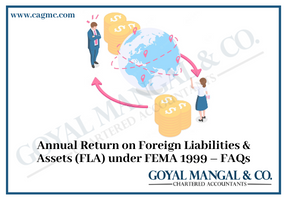Welcome to this fascinating exploration of the world of growth and quality of Foreign Direct Investment (FDI). This journey addresses the question, “Is all FDI equal?” FDI has become an integral part of today’s global economy, and countries are eager to attract foreign investment. However, not all FDI is created equal. Some provide significant benefits…
Making doing business in India simple has been a priority for the Indian government (GoI). In recent years, the idea of ease of doing business has gained momentum. The Foreign Exchange Management Act (FEMA) of 1999’s laws and the government of India’s FDI policy govern foreign investment in India. The FDI policy lays out the…
The Foreign Exchange Management Act, 1999 (FEMA) is a regulatory framework that governs all foreign exchange transactions in India. One of the key provisions under FEMA is the Annual Return on Foreign Liabilities & Assets (FLA), which requires Indian companies to report their foreign assets and liabilities to the Reserve Bank of India (RBI) on…
Foreign Direct Investment (FDI) is a significant source of funding for India’s economic growth. Following the crisis of 1991, India began its economic liberalisation, and FDI has steadily expanded since then. India now ranks first internationally for greenfield Foreign Direct Investment (FDI) and is a member of the top 100-club for ease of doing business…
Foreign Exchange Management (Overseas) Investment Rules, 2022, and Foreign Exchange Management (Overseas) Investment Regulations, 2022 notified. These replace the erstwhile Foreign Exchange Management (Transfer or issue of any Foreign Security) Regulations, 2004, and Foreign Exchange Management (Acquisition and Transfer of any Immovable Property outside India) Regulations, 2015. In this article, we briefly discuss the Overseas…
The Reserve Bank of India (RBI) is the governing body for regulating and supervising the banks. The banking Regulation Act, of 1949 is an Act that provides a framework for regulating the banks of India. The Act came into force on 16th March 1949. This Act gives RBI the power to control the behavior of…
The loan given by non-resident lenders to Indian borrowers who are qualified for the ECB is known as External Commercial Borrowing and can be made in INR or foreign currency. The financing is being used for business purposes. The ECB receives funding from international sources or any reputable organization outside of India. The criteria for…






